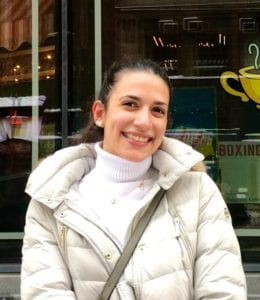Bio
 Costanza Tremante is a second-year Master of Urban Planning candidate at NYU Wagner, specializing in International Development Planning. Costanza is originally from Venezuela and has lived in Miami most of her life. As an undergraduate, she attended the University of Florida where she studied Sustainability and The Built Environment with minors in both Urban & Regional Planning and Innovation. As an urban planning student, she is interested in neighborhoods, equity, and immigration. Her past research has focused on leveraging the effects of gentrification, especially for low-income communities, and to encourage discussions around rapid urban change and displacement. She currently works as a Graduate Assistant at the NYU Migration Network. As a Gallatin Global Fellow in Urban Practice, she will be working with Paisaje Transversal, an urban planning office in Madrid that emphasizes community engagement and develops innovative and transformative urban projects.
Costanza Tremante is a second-year Master of Urban Planning candidate at NYU Wagner, specializing in International Development Planning. Costanza is originally from Venezuela and has lived in Miami most of her life. As an undergraduate, she attended the University of Florida where she studied Sustainability and The Built Environment with minors in both Urban & Regional Planning and Innovation. As an urban planning student, she is interested in neighborhoods, equity, and immigration. Her past research has focused on leveraging the effects of gentrification, especially for low-income communities, and to encourage discussions around rapid urban change and displacement. She currently works as a Graduate Assistant at the NYU Migration Network. As a Gallatin Global Fellow in Urban Practice, she will be working with Paisaje Transversal, an urban planning office in Madrid that emphasizes community engagement and develops innovative and transformative urban projects.
Mission Statement
The global COVID-19 crisis has had an unavoidable effect on the lives of many people around the world. However, based on demographics and location, everyone has had a different experience and perspective on the pandemic. On January 31, 2020, there were over 405,000 cases of COVID-19 and over 28,000 deaths in Spain. Spain was one of the countries that were most impacted by the COVD-19 pandemic. Using COVID-19 as a lens for accepting the present moment rather than trying to avoid it, we can try to understand how the pandemic affected those with no access to healthcare or with preexisting conditions. In the next few weeks, with the aid of Paisaje Transversal, I will examine the impact of COVID-19 on marginalized populations in Madrid, Spain. In reality, times of crisis may be seen as pivotal periods in which social unity and struggle are heightened in reaction to new circumstances, and new hopes for societies can be achieved.
The Gallatin Global Fellowship in Urban Practice provides funding of up to $5,000 and support for 6-10 advanced BA and MA students to pursue extended, community-engaged, practice-based research projects in partnership with urban social justice organizations.
